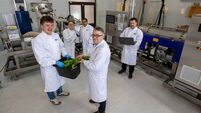Ireland joins global effort to cut agricultural methane

John Kerry, the US special presidential envoy for climate affairs, said agriculture accounts for about 33% of global carbon emissions, and attaining climate neutrality would only be possible by implementing transformative solutions for agricultural systems.
Ireland will join the International Enteric Fermentation Accelerator, described as the world’s largest single research effort to reduce agricultural methane emissions.
Some of the world's top scientists will take part in the Accelerator, developing new technology for use on farm, financed by about €200m of international investment.













